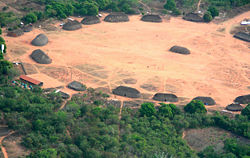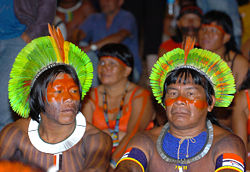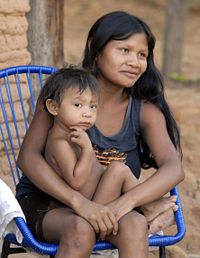|
Indigenous people brazil
When the first Portuguese explorers landed on Brazil's coast
in 1500, Brasil was inhabited by a population Semi-nomadic Indian tribes, estimated to be in the region of 1 - 2 million people. These indigenous tribes'relied upon hunting, gathering, fishing and agriculture in their day-
to-day-living.
Although very little is known about the history of Brazil prior to 1500, since it is stated that the indigenous semi- nomadic tribes of the east, never developed written records or permanent monumental architecture, archaeological remains consisting mainly of pottery, suggest a complex pattern of regional cultural
Fossils found in Minas Gerais showing evidence that Brazil had been inhabited for at least 8,000 years by an indigenous brazil people of "Indian" (Indios) origin, are still disputed among archaeologists.
This indigenous population, who occupied mainly the coastal regions along the banks of Brazil's major rivers, were viewed by the Portuguese as "noble savages" who needed to be civilized.
The Portuguese initially used Brazil's indigenous people as plantation slaves and miscegenation of the population began. As a consequence, many Brazilian Indian people soon succumbed to diseases, enforced labour, displacemen and the resulting warfare conflicts surrounding their capture and enslavement.
European diseases were spread along trade routes and quickly took their toll on the Brazil people irrespective of whether or not they came into direct contact with Europeans. Tens of thousands of the estimated 2,000 nations and tribes that existed in 1500 died as a consequence of European settlement, which brought diseases such as measles, smallpox, tuberculosis, influenza and against which the Brazil indigenous people had no immunity. The Portuguese turned their attention to importing African people for their slave labour.
In 1570, King Sebastian I ordered the Brazil natives should not be used for slavery and should be released. However, it was not until 1755 that slavery of the Brazil's indigenous natives was abolished.
The surviving Brazilian natives were absorbed into the Brazilian population, although a few native tribes can still be found in
the more remote regions of the Amazon rainforest. The offsprings
of the Portuguese colonists, created a new generation of mix-
raced people who spoke in their native Indian languages.
Return From Indigenous People Brazil To Brazil Travel Northeast Home Page |








